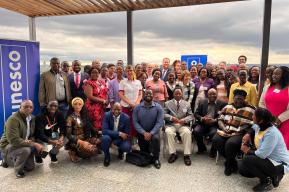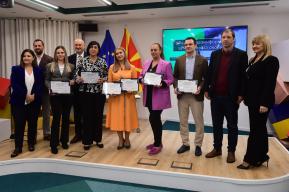News
Early Career Fellowships support 25 women scientists in the developing world

Funding for the fellowships is generously provided by Canada's International Development Research Centre (IDRC). In addition, the Aspen Institute Italia is this year funding for the first time one Early Career fellowship, marking the first step of a collaboration that will build the bridge for future opportunities to support women in science from the developing world. OWSD is a programme unit of UNESCO based at The World Academy of Sciences (TWAS) in Trieste, Italy
OWSD Early Career Fellowships
OWSD’s fellowship programme supports outstanding women scientists to lead important research projects and create centres of international excellence in the institutes where they are employed. These institutes are based in the 66 countries identified by OWSD as ‘scientifically and technologically lagging’ (39 are in Africa). As well as funds to build up laboratories and purchase equipment, the flexible grant pays special attention to the challenges that women researchers face and can be used to hire MSc students and technicians, invite international speakers, produce webinars, develop training programmes as well as establish connections with industry.
During the 3-year fellowship, fellows will receive specific training to build on their leadership and management skills and develop connections with a variety of public and private sector partners to potentially convert their research into marketable products or guarantee its impact on a broader scale. By improving their communication and outreach skills, fellows will also learn to effectively present their research to various audiences, thus attracting new collaborators and potential funders to ensure the sustainability of the research project.
The first step of a collaboration with the Aspen Institute
The Aspen Institute Italia is this year funding for the first time, one Early Career fellowship with the OWSD. The fellowship provides a grant of USD $50,000 to an outstanding scientific researcher to create a centre of international excellence in the institute where she is employed.
The Aspen Institute-funded fellow, Dr. Mary Adjepong, is a Registered Dietician and Lecturer at the Kwame Nkrumah University of Science and Technology (KNUST), in Ghana. She is passionate about research that can improve the health outcomes of vulnerable individuals by focusing on nutrition and lifestyle. Thanks to the OWSD Early Career Fellowship, she will be able to focus her research on producing complementary food products that are rich in essential fatty acid (EFA) and carotenoids to reduce childhood stunting, enhance cognitive development and improve ocular health in children.
Alberto Quadrio Curzio, President Emeritus of the Italian Academy of Sciences, OWSD Ambassador and Member of the Executive Committee of Aspen Institute Italia, had a pioneering role in proposing this agreement between Italian scientific institutions and OWSD, building a bridge towards future opportunities. “It is an agreement that marks the first step of a collaboration that already has its foundations between the Italian science system and OWSD” said Quadrio Curzio.
Tonya Blowers, Coordinator of the OWSD Secretariat said that "The Aspen Institute Italia shares a similar mission to OWSD, a belief in the importance of diversity and inclusion in order to ensure international economic progress." Women from developing countries are typically marginalised in scientific debates and research. The Aspen Institute recognises that OWSD can bring women to the table not only to be heard but to lead their country's scientific projects. Blowers added, "we hope that other Institutes and Foundations in Italy will follow the Aspen Institute's lead and sponsor an OWSD Fellow."
2022 Early Career Fellows
Mavis Agyeiwaa Acheampong
Ghana
School of Agriculture, University of Ghana
Agricultural Sciences
Research project: Integrated biocontrol of key pests and diseases of chilli pepper using microbial plant extract formulation
Saphina Biira
Uganda
Busitema University
Physics
Research project: Energy recovery from solid waste and water treatment in Tororo, Uganda
Khongorzul Batchuluun
Mongolia
Mongolian National University of Medical Sciences
Medical and Health Sciences including Neurosciences
Research project: Pituitary adenoma (tumors and carcinoma) among Mongolians and its pathological features: cancer stem cell and its relation to cell adhesion molecules and cell signaling
Maria Helena Paulo António
Mozambique
School of Marine and Coastal Sciences, Eduardo Mondlane University
Biological Systems and Organisms
Research project: Morphodynamic evaluation of the bons sinais estuary and it’s implication on the fisheries sustainability: an alternative approach to understand the relationship between morphodynamics, population ecology and environment preservation
Mary Adjepong
Ghana
College of Science, Kwame Nkrumah University of Science and Technology (KNUST)
Medical and Health Sciences including Neurosciences
Research project: Complementary feeding product that is rich in essential fatty acid (EFA) and carotenoids to improve ocular health, enhance cognitive development and growth in children
Hazir Elhaj
Sudan
Sudan University of Science and Technology
Engineering sciences
Research project: Ensuring a sustainable energy transition in rural areas of Sudan by use of appropriate technologies.
Astride Carole Djeuani
Cameroon
The University of Yaoundé 1
Agricultural Sciences
Research project: Molecular characterization of Endophytics and phosphorus solubilizing fungi associated with rhizome used as the seeds in Araceae plants during plant growth under biofertilization.
Vivian Etsiapa Boamah
Ghana
Faculty of Pharmacy and Pharmaceutical Sciences, Kwame Nkrumah University of Science and Technology (KNUST)
Medical and Health Sciences incl Neurosciences
Research project: Development of wound-healing formulation from indigenous medicinal plants for management of chronic wounds – through management of Cutaneous Leishmaniasis (CL) lesions in CL endemic communities in Ghana.
Daphne Nyachaki Bitalo
Uganda
National Coffee Research Institute
Agricultural Sciences
Research project: Improving Uganda's cocoa farm fermentation through controlled microbial interventions.
Namaunga Kasumu Chisompola
Zambia
School of Medicine, Copperbelt University
Medical and Health Sciences incl Neurosciences
Research project: Elucidating the mechanisms of action of medicinal plants used in Zambia in the treatment of opportunistic infections in people living with human immunodeficiency virus.
Alice Nabatanzi
Uganda
Makerere University
Medical and Health Sciences incl Neurosciences
Research project: Prevention and management of postpartum hemorrhage (pph) using affordable, effective, and safe phytouterotonics.
Anna Haji Msigwa
Tanzania
The Nelson Mandela African Institution of Science and Technology (NM-AIST)
Astronomy, Space and Earth Sciences
Research project: Remote sensing and machine learning in water stress detection, with an emphasis on applications in maize farming.
Neema Mathias Mduma
Tanzania
The Nelson Mandela African Institution of Science and Technology (NM-AIST)
Computing and Information Technology
Research project: Deep learning tools for early detection of diseases affecting common bean and Irish potato in the Southern Highlands Regions of Tanzania.
Edith Talina Luhanga
Rwanda
Carnegie Mellon University Africa
Computing and Information Technology
Research project: Mobile applications for prevention of maternal and child malnutrition through early warning and behavior change support.
Eva Dora da Cruz João
Mozambique
Manhiça Health Research Centre, Fundação Manhiça
Medical and Health Sciences incl Neurosciences
Research project: Exploring the relationship between environmental enteropathy biomarkers and response to the oral monovalent vaccine, Rotarix©, in children less than five years at Manhiça district, a rural setting in Mozambique.
Marilyn Chepkurui Ronoh
Kenya
University of Embu
Mathematical sciences
Research project: Using computational modelling and artificial intelligence to enhance HIV testing, status awareness, and status disclosure among adolescent boys and girls and young men and women in Kenya.
Sadia Isfat Ara Rahman
Bangladesh
International Centre for Diarrhoeal Disease Research, Bangladesh
Medical and Health Sciences incl Neurosciences
Research project: Impact of the Vi-tetanus toxoid typhoid conjugate vaccine (Vi-TT) on reducing the AMR burden in the cluster randomized TyVAC trial in Bangladesh.
Maura Liseth Quezada Aguilar
Guatemala
Faculty of Chemical Sciences and Pharmacy, Universidad de San Carlos de Guatemala
Biological Systems and Organisms
Research project: OAKS as key elements of forest conservation in the volcanic chain of Guatemala: looking for species at risk and establishing community nurseries.
Luria Leslie Njoungang Yontchoung Epse Founou
Cameroon
Research Institute of the Centre of Expertise and Biological Diagnostic of Cameroon
Medical and Health Sciences incl Neurosciences
Research project: An Integrated Approach for Monitoring and Predictive Diagnostic of Neonatal Infections (TARGET).
Asha Dilrukshi Wijegunawardana Nahallage Dona
Sri Lanka
Rajarata University of Sri Lanka
Structural, Cell and Molecular Biology
Research project: Determination of the feasibility of paratransgenesis approach for controlling sand fly vectors in Anuradhapura district, Sri Lanka.
Piwai Tshuma
Zimbabwe
Midlands State University
Chemical Sciences
Research project: Design and synthesis of enzyme functionalised Metal-Organic Frameworks for conversion of carbon dioxide to formic acid: repurposing a greenhouse gas for energy applications.
Samawansha Harsheni Tennakoon
Sri Lanka
Sri Jayewardenepura University
Structural, Cell and Molecular Biology
Research project: Investigation of chemical and biological properties of a plant-based treatment used in Sri Lanka to treat cancer patients.
Subhangi Subedi
Nepal
Tribhuvan University
Chemical Sciences
Research project: Carbon quantum dot as a next-generation smart fluorescent probe to scrutinize and control environmental threats.
Supriya Sharma
Nepal
Institute of Science and Technology, Central Department of Microbiology (CDM), Tribhuvan University
Biological Systems and Organisms
Research project: Combating against antibiotic resistance: Using nanoparticles combined with antibiotics against WHO recognized antibiotic resistant priority pathogens from pigeon droppings of selected temples of Kathmandu, Nepal.
Margarita Ramona Ruiz Olazar
Paraguay
Comunera University
Computing and Information Technology
Research project: A computational system for analysis and visualization of neuroimaging experimental data
Organization for Women in Science for the Developing World (OWSD)
OWSD was founded in 1987 and is the first international forum to unite eminent women scientists from the developing and developed worlds with the objective of strengthening their role in the development process and promoting their representation in scientific and technological leadership. OWSD provides research training, career development and networking opportunities for women scientists throughout the developing world at different stages in their careers. OWSD is hosted by The World Academy of Sciences for the advancement of science in developing countries (TWAS), a UNESCO Programme based in Trieste, Italy.









